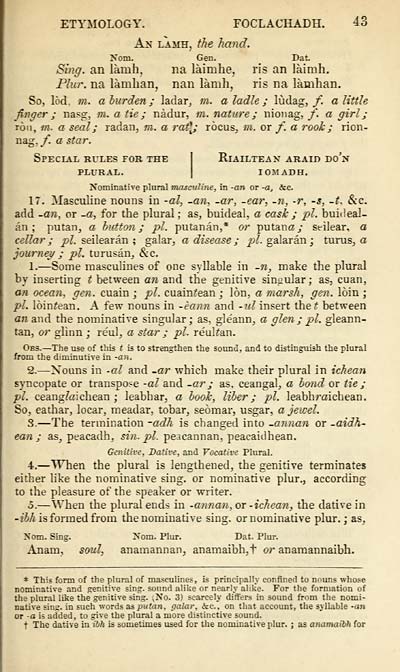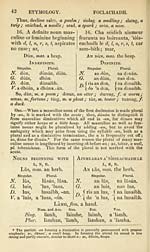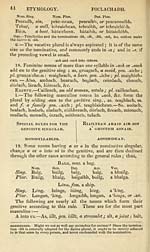Books and other items printed in Gaelic from 1841 to 1870 > Stéidhean a' Ghràmair Ghaëlig
(71) Page 43
Download files
Complete book:
Individual page:
Thumbnail gallery: Grid view | List view

ETYMOLOGY. FOCLACHADH. 43
An lamh, the hand.
Noni. Gen. Dat.
Sing. an lànih, na làiinhe, ris an làimh.
Plur. na lànihan, nan làmh, ris na làmhan.
So, lòd. m. a burden ; ladar, m. a ladle ; lùdag, f. a Httle
finger ; nasg, m. a tie ; nàdur, m. nature ; nionag, f. a girl ;
ròu, m. a seal ; rarìan, m. a rat\; ròcus, m. or f a rook ; rion-
nag. /. a star.
Special rules for the Riailtean araib do'n
plural. iomadh.
Nominative plural mascuUne, in -an or -a, &c.
17. Masculine nouns in -al, -an, -ar, -ear, -n, -r, -s, -t. &c.
add -a?i, or -a, for the plural; as, buideal, a cask ; pl. buideal-
àn ; putan, a button ; pl. putanàn,* or putanG j,- seilear, a
cellar ; pl. seilearàn ; galar, a disease ; pl. galaràn j turus, a
journey ; pl. turusàn, &c.
1. — Some masculines of one syllable in -n, make the plural
by inserting t between an and the genitive singular ; as, cuan,
an ocean, gen. cuain ; pl. cuainfean ; lòn, a marsh, gen. lòin ;
pl. lòin^ean. A few nouns in -èann and -id insert the t between
an and the nominative singular; as, glèann, a glen ; pl. gleann-
tan, or glìnn ; rèul, a star ; pl. rèultfan.
Obs. — The use of this t is to strengthen the sound, and to distinguish the plural
from the diminutive in -an.
2. — Xouns in -al and -ar which make their plural in ichean
syncopate or transpose -al and -ar ; as, ceangal, a bo/id or tie ;
pl. ceangfeichean ; leabhar, a book, liber ; pl. leabhraichean.
So, eathar, locar, meadar, tobar, seòmar, usgar, a jewel.
3. — The termination -adh is changed into -annan or -aidh-
ean ; as^ peacadh, sin.pl. peacannan, peacaidhean.
Gcnitive, Dative, and Vocative Plural.
4. — When the plural is lengthened^, the genitive terminates
either like the nominative sing. or nominative plur., according
to the pleasure of the speaker or writer.
5. — \Yhen the plural ends in -annan, or -ichean, the dative in
-ièAisformedfrom thenominative sing. ornominative plur. ; as,
Nom. Sing. Nom. Plur. Dat. Plur.
Anam, soul, anamannan, anamaibh,t or anamannaibh.
* This form of the plural of maseulines, is principally confined to nouns whose
nominative and genitive sing. sound alike or nearly alike. For the formation of
the plural like the genitive sing. v No. 3) scarcely differs in sound from the nomi-
native sing. in such words as putan, galar, &c", on that account, the syllable -an
or -a is added, to give the plural a more distinctive sound.
t The dative in ibh is sometimes used for tlie nominative plur. ; as anamaibh for
An lamh, the hand.
Noni. Gen. Dat.
Sing. an lànih, na làiinhe, ris an làimh.
Plur. na lànihan, nan làmh, ris na làmhan.
So, lòd. m. a burden ; ladar, m. a ladle ; lùdag, f. a Httle
finger ; nasg, m. a tie ; nàdur, m. nature ; nionag, f. a girl ;
ròu, m. a seal ; rarìan, m. a rat\; ròcus, m. or f a rook ; rion-
nag. /. a star.
Special rules for the Riailtean araib do'n
plural. iomadh.
Nominative plural mascuUne, in -an or -a, &c.
17. Masculine nouns in -al, -an, -ar, -ear, -n, -r, -s, -t. &c.
add -a?i, or -a, for the plural; as, buideal, a cask ; pl. buideal-
àn ; putan, a button ; pl. putanàn,* or putanG j,- seilear, a
cellar ; pl. seilearàn ; galar, a disease ; pl. galaràn j turus, a
journey ; pl. turusàn, &c.
1. — Some masculines of one syllable in -n, make the plural
by inserting t between an and the genitive singular ; as, cuan,
an ocean, gen. cuain ; pl. cuainfean ; lòn, a marsh, gen. lòin ;
pl. lòin^ean. A few nouns in -èann and -id insert the t between
an and the nominative singular; as, glèann, a glen ; pl. gleann-
tan, or glìnn ; rèul, a star ; pl. rèultfan.
Obs. — The use of this t is to strengthen the sound, and to distinguish the plural
from the diminutive in -an.
2. — Xouns in -al and -ar which make their plural in ichean
syncopate or transpose -al and -ar ; as, ceangal, a bo/id or tie ;
pl. ceangfeichean ; leabhar, a book, liber ; pl. leabhraichean.
So, eathar, locar, meadar, tobar, seòmar, usgar, a jewel.
3. — The termination -adh is changed into -annan or -aidh-
ean ; as^ peacadh, sin.pl. peacannan, peacaidhean.
Gcnitive, Dative, and Vocative Plural.
4. — When the plural is lengthened^, the genitive terminates
either like the nominative sing. or nominative plur., according
to the pleasure of the speaker or writer.
5. — \Yhen the plural ends in -annan, or -ichean, the dative in
-ièAisformedfrom thenominative sing. ornominative plur. ; as,
Nom. Sing. Nom. Plur. Dat. Plur.
Anam, soul, anamannan, anamaibh,t or anamannaibh.
* This form of the plural of maseulines, is principally confined to nouns whose
nominative and genitive sing. sound alike or nearly alike. For the formation of
the plural like the genitive sing. v No. 3) scarcely differs in sound from the nomi-
native sing. in such words as putan, galar, &c", on that account, the syllable -an
or -a is added, to give the plural a more distinctive sound.
t The dative in ibh is sometimes used for tlie nominative plur. ; as anamaibh for
Set display mode to:
![]() Universal Viewer |
Universal Viewer | ![]() Mirador |
Large image | Transcription
Mirador |
Large image | Transcription
Images and transcriptions on this page, including medium image downloads, may be used under the Creative Commons Attribution 4.0 International Licence unless otherwise stated. ![]()
| Rare items in Gaelic > Books and other items printed in Gaelic from 1841 to 1870 > Stéidhean a' Ghràmair Ghaëlig > (71) Page 43 |
|---|
| Permanent URL | https://digital.nls.uk/101712451 |
|---|
| Description | Out-of-copyright books printed in Gaelic between 1631 and 1900. Also some pamphlets and chapbooks. Includes poetry and songs, religious books such as catechisms and hymns, and different editions of the Bible and the Psalms. Also includes the second book ever published in Gaelic in 1631. |
|---|

